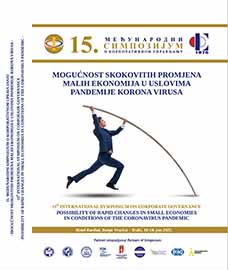NEOLIBERALIZAM, INSTITUCIONALIZAM ILI INTERVENCIONIZAM: MERE I PRINCIPI POSLE KRIZE COVID-19
NEOLIBERALISM, INSTITUTIONALISM, OR INTERVENTIONISM: MEASURES AND PRINCIPLES AFTER COVID-19 CRISIS
Author(s): Miroljub Labus
Subject(s): Economy, National Economy, Micro-Economics, Marxist economics, Health and medicine and law, Public Finances, Socio-Economic Research
Published by: Finrar d.o.o Banja Luka
Keywords: neoliberalism; institutionalism; state interventionism; Serbia; Bosnia and Herzegovina;COVID-19 crisis;
Summary/Abstract: Our response to whether the rapid growth of small open economies is feasible in the conditions of this coronary virus pandemic is negative. That should not disappoint us since it is better to fix imbalances than to have unsustainable growth. We study in this paper the implementation of economic policy measures in Serbia and Bosnia and Herzegovina with the aim to identify their origin in the doctrines of neoliberalism, institutionalism, and state interventionism. State interventionism with ad hoc solutions and the creation of imbalances was the dominant but not the exclusive basis for conducting economic policy. We expect this policy mix to continue in the post-Covid19 period. At the same time, we point out the similarity of this crisis with the Great Recession of 2009. If we ignore this, there is a significant risk that we will repeat the mistakes of the past, the negative consequences of which were present until this crisis. We are not a priori against state intervention but its transformation into state fundamentalism. To avoid that, we propose its phased mitigation as the crisis evaporates. We do not share the optimism that Serbia and BiH will have high and sustainable growth in the medium term without changing economic policy and eliminating fundamental disturbances in the economy.
Book: 15. MEĐUNARODNI SIMPOZIJUM O KORPORATIVNOM UPRAVLJANJU
- Page Range: 87-105
- Page Count: 19
- Publication Year: 2021
- Language: Serbian
- Content File-PDF

